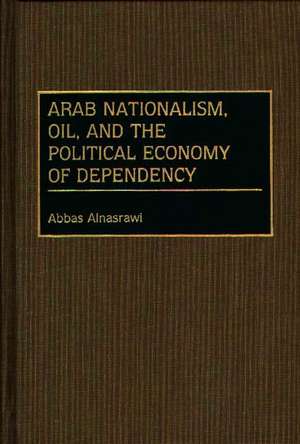Arab Nationalism, Oil, and the Political Economy of Dependency: Contributions in Economics and Economic History
Autor Abbas Alnasrawien Limba Engleză Hardback – 29 mai 1991 – vârsta până la 17 ani
Din seria Contributions in Economics and Economic History
- 28%
 Preț: 437.07 lei
Preț: 437.07 lei - 27%
 Preț: 446.44 lei
Preț: 446.44 lei - 27%
 Preț: 441.64 lei
Preț: 441.64 lei - 24%
 Preț: 464.32 lei
Preț: 464.32 lei - 28%
 Preț: 344.98 lei
Preț: 344.98 lei - 28%
 Preț: 438.07 lei
Preț: 438.07 lei - 27%
 Preț: 438.41 lei
Preț: 438.41 lei - 27%
 Preț: 438.24 lei
Preț: 438.24 lei - 38%
 Preț: 345.67 lei
Preț: 345.67 lei - 38%
 Preț: 437.91 lei
Preț: 437.91 lei - 28%
 Preț: 437.40 lei
Preț: 437.40 lei - 28%
 Preț: 436.92 lei
Preț: 436.92 lei - 28%
 Preț: 437.24 lei
Preț: 437.24 lei - 18%
 Preț: 355.60 lei
Preț: 355.60 lei - 28%
 Preț: 437.47 lei
Preț: 437.47 lei - 38%
 Preț: 437.67 lei
Preț: 437.67 lei - 27%
 Preț: 438.76 lei
Preț: 438.76 lei - 38%
 Preț: 438.33 lei
Preț: 438.33 lei - 24%
 Preț: 464.05 lei
Preț: 464.05 lei - 27%
 Preț: 442.81 lei
Preț: 442.81 lei - 28%
 Preț: 437.47 lei
Preț: 437.47 lei - 24%
 Preț: 462.20 lei
Preț: 462.20 lei - 28%
 Preț: 437.84 lei
Preț: 437.84 lei - 27%
 Preț: 438.59 lei
Preț: 438.59 lei - 28%
 Preț: 434.78 lei
Preț: 434.78 lei - 38%
 Preț: 345.83 lei
Preț: 345.83 lei - 27%
 Preț: 438.51 lei
Preț: 438.51 lei - 28%
 Preț: 438.07 lei
Preț: 438.07 lei - 28%
 Preț: 437.40 lei
Preț: 437.40 lei - 27%
 Preț: 634.79 lei
Preț: 634.79 lei - 24%
 Preț: 363.98 lei
Preț: 363.98 lei - 28%
 Preț: 459.08 lei
Preț: 459.08 lei - 27%
 Preț: 345.67 lei
Preț: 345.67 lei - 28%
 Preț: 436.99 lei
Preț: 436.99 lei - 24%
 Preț: 463.30 lei
Preț: 463.30 lei - 24%
 Preț: 464.48 lei
Preț: 464.48 lei - 38%
 Preț: 443.73 lei
Preț: 443.73 lei - 38%
 Preț: 436.57 lei
Preț: 436.57 lei - 38%
 Preț: 441.29 lei
Preț: 441.29 lei - 27%
 Preț: 363.73 lei
Preț: 363.73 lei - 24%
 Preț: 462.45 lei
Preț: 462.45 lei - 38%
 Preț: 345.23 lei
Preț: 345.23 lei - 38%
 Preț: 437.07 lei
Preț: 437.07 lei - 38%
 Preț: 439.17 lei
Preț: 439.17 lei - 28%
 Preț: 344.82 lei
Preț: 344.82 lei - 28%
 Preț: 437.31 lei
Preț: 437.31 lei - 28%
 Preț: 435.55 lei
Preț: 435.55 lei - 28%
 Preț: 437.07 lei
Preț: 437.07 lei - 28%
 Preț: 437.31 lei
Preț: 437.31 lei - 38%
 Preț: 439.85 lei
Preț: 439.85 lei
Preț: 438.76 lei
Preț vechi: 604.78 lei
-27% Nou
Puncte Express: 658
Preț estimativ în valută:
83.97€ • 87.34$ • 69.32£
83.97€ • 87.34$ • 69.32£
Carte tipărită la comandă
Livrare economică 15-29 aprilie
Preluare comenzi: 021 569.72.76
Specificații
ISBN-13: 9780313276101
ISBN-10: 0313276102
Pagini: 232
Dimensiuni: 156 x 235 x 23 mm
Greutate: 0.57 kg
Ediția:New.
Editura: Bloomsbury Publishing
Colecția Praeger
Seria Contributions in Economics and Economic History
Locul publicării:New York, United States
ISBN-10: 0313276102
Pagini: 232
Dimensiuni: 156 x 235 x 23 mm
Greutate: 0.57 kg
Ediția:New.
Editura: Bloomsbury Publishing
Colecția Praeger
Seria Contributions in Economics and Economic History
Locul publicării:New York, United States
Notă biografică
ABBAS ALNASRAWI is Professor of Economics at the University of Vermont.e His previous publications include Financing Economic Development in Iraq: The Role of Oil in the Middle Eastern Economy, Arab Oil and United States Energy Requirements (1982), the EC in a Changing World Economy, and, as co-editor, Consistency of U.S. Foreign Policy: The Gulf War and the Iran-Contra Affair's Foreign Policy (1989). Since 1971 he has published numerous articles, monographs, and chapters on Arab and mid-Eastern economies.
Cuprins
Emergence of Modern Arab Economic DependenceArab Nationalism, Dependency, and World CapitalismArab Nationalism and Arab Economic UnityMultinational Oil and the Deepening of Arab DependencyArab Nationalism and the Arab Oil "Weapon": The Built-In FailureThe Role of Saudi Arabia and the United States in the Fall of OPECThe 1980s, the Iran-Iraq War, and the Myth of Arab Oil PowerDimensions of Arab Economic DependencyThe Arab Economics: Present Conditions and Future OutlookEpilogue: Arab Nationalism, Oil, Dependency, and the Gulf CrisisBibliographyIndex













